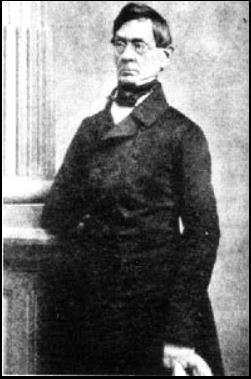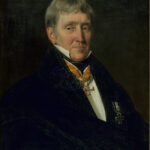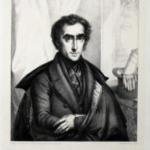There are not many controversial figures in Beethoven’s life comparable to Anton Schindler. Probably Johanna van Beethoven, wife of his brother Karl, with whom Beethoven had legal and emotional battles over the custody of his nephew. Schindler forged history, destroyed evidence and based a career on the short relationship he had with Beethoven.
Who was Anton Schindler?
Anton Felix Schindler was born in 1795 in Meedel (Moravia) and died in 1864 in Bockenheim (today part of Frankfurt). He moved to Vienna in 1813 to study law and philosophy at the University of Vienna. He played violin from childhood, he was competent, but not exceptional at it.
In 1822 he had given up his law career and became first violinist at the Theater in der Josefstadt, later from 1825 at the Theater am Kärntnertor.
After the death of Beethoven he had left Vienna for Budapest, where he was a music teacher, but later he also lived in Münster and Aachen. He worked there as a musical director.
It was in Münster where in 1840 he published his infamous Beethoven biography, Beethoven, as I knew him. In this Schindler names himself the unpaid secretary and confidant of Beethoven from 1819 until his death.
How and when did Beethoven meet Schindler?
The two met for the first time in 1814, when the young violinist delivered a letter from Ignaz Schuppanzigh to Beethoven. They met regularly in the coming years, but it is not possible to point to a certain year when Schindler officially became his secretary.
According to Schindler he became his helper from 1819. Apart from his testimony nothing else supports this year as a starting point. The first written authentic evidence of this kind of relationship is from June 1822, a letter from Beethoven to Schindler.
What is the ‘sin’ of Anton Schindler?
In short: Schindler forged history, destroyed evidence and based a career on the short relationship he had with Beethoven!
After the death of Beethoven, on the following day, he stole valuable things from his apartment. Many conversation books (some estimations put it to 400 books), manuscripts, letters, his clock, glasses and even ear trumpets were stolen.
He later forged entries about himself in the conversation books, many pages were simply teared out. Nothing he said or wrote should be accepted unless there is supporting evidence from another source!
Later he sold some of these books and manuscripts the majority simply disappeared.
What was the reputation of Schindler?
Heinrich Heine, the poet, described Schindler as “a long black beanpole with a horrible white necktie and the expression of a funeral director…”. He considered Schindler a nobody who wanted to profit from the relationship he had with Beethoven. Both Wegeler (a life long friend of Beethoven) and Ries (his student) detested Schindler.
Schindler had difficult relationship with anybody who was closer to Beethoven than he was. His brother, his nephew Karl, his friends and his patrons all had a thing to say about Schindler.
This was nothing new to Beethoven. He saw right through the man. He called him an importunate hanger-on.
Despite all this Schindler was able to remain close to Beethoven, because the composer needed a helping hand, a secretary who was willing to work for him without any payment. Previously Franz Oliva was his right hand, until he left for Russia in 1820. Baron Zmeskall, his brothers Karl and Johann were helpers too, but because of different reasons they were not available beyond 1820. Then, along came Schindler saw his opportunity and took it.
Can we say anything positive about this man?
Yes, we can! He was a faithful errand and helper of Beethoven until his last day. He revered and served the composer the best he could. One letter from Beethoven shows his respectful attitude as he wrote to Schindler “…when you write me do it in the exact same way as I do to you. That is to say, without giving me a title, without addressing me, without signing your name…”
He was not a great musician, but understood music. Especially Beethoven’s music. Many of his remarks on the piano sonatas, for example, are important and regarded valid even today. His words about Fate knocking on the door in the Fifth Symphony, if Beethoven really said that, we do not know; but, it is still widespread and popular today as we all feel it is somehow true.
The relationship of the two suffered badly following the premiere of the Ninth Symphony. After the concert, when Beethoven realized how little the financial profit was, he collapsed on the ground. As so often in his last years his paranoia made him say things he later regretted. Two days later he accused his friends and Schindler of stealing the money…
When Beethoven calmed down, in a letter to Schindler he apologized, but also stated “In any case I would much rather try to repay frequently with a small gift the services you render me, than have you at my table. For I confess that your presence irritates me in so many ways… For owing to your vulgar outlook how could you appreciate anything that is not vulgar?!”
After this letter the two never fully reconciled.







